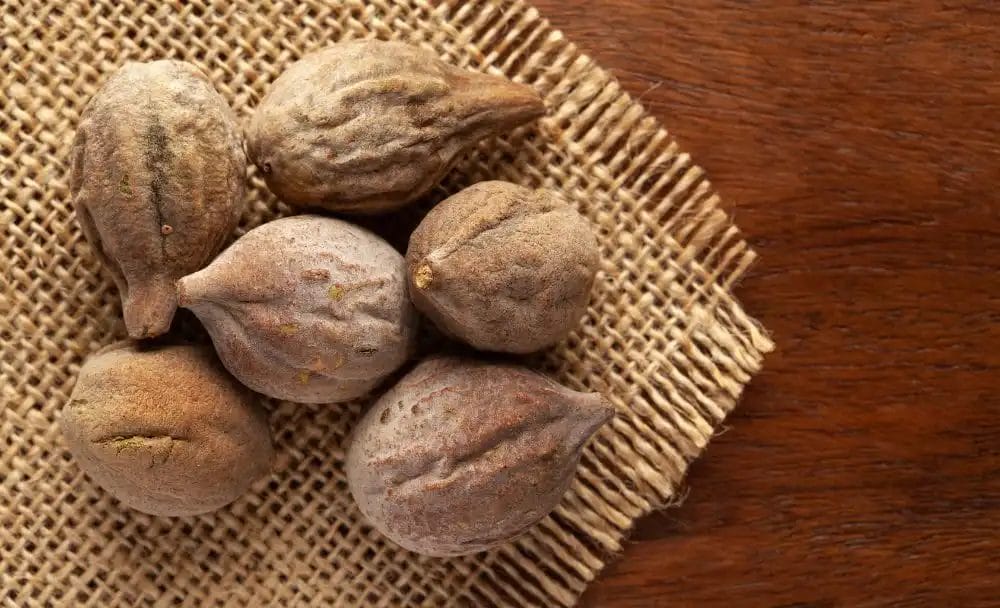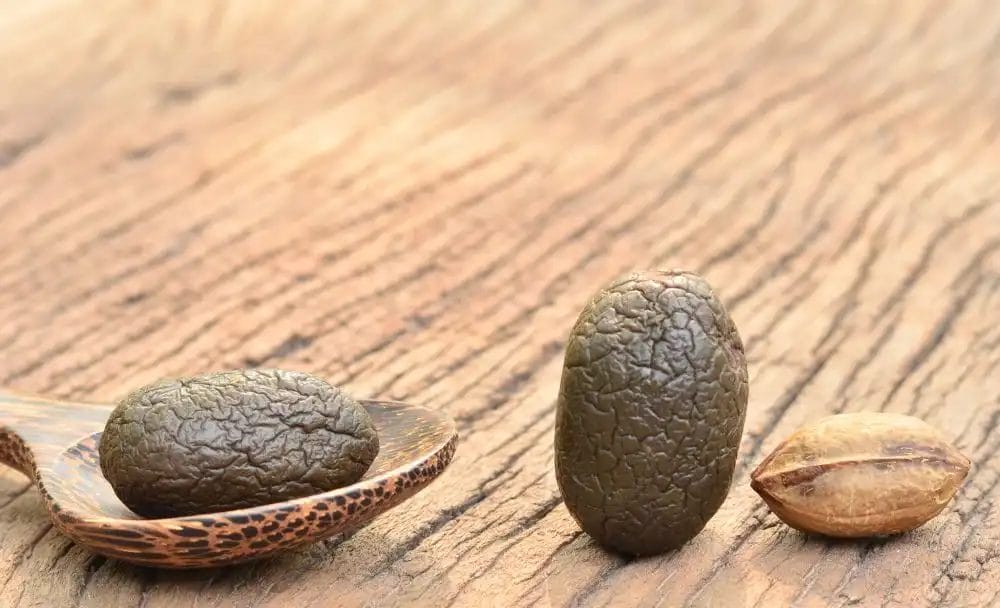
This article is reviewed by an expert
Baheda, also known as Terminalia bellirica, is a remarkable tree from the family Combretaceae. Renowned as Bibhitaki, Vibhitaki, or Baheda in India, this ancient herb holds a special place in Ayurvedic medicine. Often used as a “health-harmonizer” alongside Amla and Haritaki in Triphala, Baheda has been utilised for centuries to address various health concerns (1).
Baheda’s potency lies in its impressive array of phytoconstituents, including glycosides, flavonoids, tannins, phenolic compounds, amino acids, and saponins. These bioactive compounds underpin its diverse pharmacological activities, such as anti-diabetic, antimicrobial, anticancer, hepatoprotective, and antidiarrheal effects (1).
In this article, find out more about Baheda, its benefits and uses and incorporate this herb into your daily life.
Ayurvedic Properties of Baheda
Rasa (Taste) and Guna (Qualities) (1)
Baheda is characterised by its Kashaya (astringent) taste, making it unique in its flavour profile. It possesses Rooksha (dry) and Laghu (light to digest) qualities, contributing to its overall effects on the body.
Vipaka (Taste Conversion) and Veerya (Potency) (1)
After digestion, Baheda undergoes Madhura (sweet) taste conversion. It also exhibits Ushna (hot) potency, which influences its impact on the body.
Effect on Tridosha (1)
In Ayurveda, Baheda is believed to balance Kapha and Pitta Doshas, helping to maintain harmony and well-being in the body.
The Many Benefits of Baheda
1. Baheda Tree For Preventing Muscle Spasms
Studies have revealed that the Baheda tree can aid in relieving muscle spasms of the smooth muscles of the bowel wall. Additionally, it can also relax the muscles of the lungs to broaden the airways, thus ensuring stable breathing. The two main properties enabling herbs to offer these benefits are anticholinergic (relief the stomach or bladder cramps) and calcium antagonists (resist the calcium from entering the heart muscle cells and blood vessels).
Additionally, it provides protection against diarrhoea and bronchoconstriction in rodents, making it a potential remedy for hyperactive gastrointestinal and respiratory disorders.
2.Baheda for Antifungal Activity
The ethanolic extract of Baheda fruit has demonstrated significant antifungal activity against Cryptococcus neoformans, The bioactive compounds of the tree enable it to possess considerable anti-fungal properties. with clinical isolates being more susceptible than environmental ones.
This finding suggests its potential in inhibiting drug-resistant fungal strains, thus offering a possible treatment option for fungal infections.
3. Baheda for Antimicrobial Activity (1)
Baheda has shown promising antimicrobial activity against respiratory pathogens, specifically Staphylococcus aureus and Klebsiella pneumonia. It inhibits the blood clotting activity in coagulase activity in S. aureus and causes biochemical alterations in both strains, indicating its potential in combating diseases caused by pathogens.
4.Baheda for Antioxidant Activity (1)
Baheda fruit’s acetone extract has been found to possess free radical effectively i.e., it possesses antioxidant properties. scavenging activity and antioxidant potential. The polyphenolic-rich fractions in the ethyl acetate fraction exhibit effectiveness in various antioxidant assays, making Baheda a valuable natural antioxidant.
5.Baheda for Anti-ulcer Activity (1)
Research has shown that the ethanolic extract of the Baheda fruit exhibits anti-ulcer activity. It effectively inhibits gastric lesions induced by pylorus ligation and ethanol along with reducing free acidity and ulcer index, suggesting its potential in managing ulcers.
6. Baheda for Anti-Alzheimer’s Activity (1)
Baheda has been studied for its acetylcholinesterase inhibitory properties, indicating potential anti-Alzheimer’s activity. Its ability to inhibit enzyme activity suggests that it could be used for the symptomatic treatment of Alzheimer’s disease.
7. Baheda for lowering blood-pressure levels (1)
Studies have shown that Baheda has a blood-pressure-lowering effect through its Ca++ antagonist properties. It induces a dose-dependent fall in arterial blood pressure and relaxes contractions in the arteries, making it a potential treatment option for hypertension.

8. Baheda for Immunomodulatory Effect(1)
The methanolic extract of Baheda fruit has exhibited immunomodulatory effects, stimulating macrophage phagocytosis and activating lymphocyte proliferation. This effect on the immune system indicates its potential in the treatment of immune-mediated diseases in humans.
9. Baheda for Antifertility Activity (1)
Research has explored the antifertility potential of Baheda bark extracts. Administration of these extracts resulted in a decrease in the weight of accessory reproductive ducts, an increase in total cholesterol content, and a significant decrease in epididymal sperm count in adult male rats. This indicates the possible role of Baheda in male contraception.
10. Baheda for Anti-Cancer Activity (1)
Terminalia bellerica leaves have been studied for their anti-cancer activity. Among different extracts, petroleum ether extract exhibited the most potent anti-cancer effects against various cancer cell lines, including ovarian carcinoma, liver carcinoma, breast carcinoma, HeLa contaminant, cervical carcinoma, CNS-human glioblastoma, non-small lung cancer, colon adenocarcinoma, fibrosarcoma, leukaemia, and melanoma. This finding suggests the possibility of isolating compounds responsible for these activities for further research.
11. Baheda for Anti-diabetic Activity (1)
Gallic acid, isolated from the fruit rind of Terminalia bellirica, has shown anti-diabetic properties. Administered to diabetic rats, gallic acid led to a dose-dependent reduction in plasma glucose levels and regeneration of β-islet cells. Furthermore, it improved several metabolic parameters, indicating its potential as an anti-diabetic agent.
12. Baheda for a cure for Liver Ailment (1)
The ethyl acetate extract of T. bellirica aerial parts has been investigated for its hepatoprotective activity. In mice intoxicated with carbon tetrachloride, this extract ameliorated hepatic necrosis and reduced oxidative stress biomarkers. It also showed a suppressive effect on inflammatory response and hepatic fibrosis, indicating its hepatoprotective potential.
Traditional Uses of Baheda
Bhedanam – Laxative Action (1)
Baheda is known for its Bhedanam property it helps relax the muscle spasms of the bowel walls, ease, which eases motion and provides a mild laxative action, aiding in promoting healthy bowel movements.
Kasanashanam – Relief from Cough and Cold (1)
The herb is effective in providing relief from cough and cold, making it a beneficial remedy for respiratory ailments.This is possible due to its Kapha balancing property. Also, the antimicrobial and anti-allergic properties enable the herb to treat cough and cold.
Netrahitam – Good for Eyes (1)
Baheda is considered beneficial for the eyes, supporting visual health and maintaining eye function.It helps to improve vision, effectively handle myopia and cataracts, reduce eye strain, etc.
Keshya – Promotes Hair Growth and Hair Quality (1)
For hair care, Baheda is esteemed as Keshya, as it improves hair quality and promotes hair growth, making it a valuable ingredient in hair care formulations. Due to its kashaya and ruksha properties, baheda helps in removing excess oil and maintaining scalp moisture to inhibit the growth of dandruff.
Kruminashanana – Relief from Worm Infestation (1)
The herb has been used traditionally to provide relief from worm infestation, promoting a healthy digestive system. The bioactive fraction of the fruit helps in combating diarrhoea effectively.
Vaisvaryanashana – Relieves Hoarseness of Voice (1)
Baheda is known to alleviate hoarseness of the voice, making it beneficial for maintaining vocal health. The fruit pulp from Baheda helps clear the blocked phlegm, which helps eliminate the hoarse voice.
Detoxification Properties (1)
Baheda is renowned for its detoxifying effects on the blood, lymph, muscles, and fatty tissues in the body.
More Specific Uses (1)
The seed kernel of Baheda is particularly useful in relieving Trut (excessive thirst) and Chardi (vomiting).
Dosage of Baheda
Baheda is usually taken with Amla and Haritaki in a 1:1:1 ratio, commonly known as Triphala. However, if you wish to take Baheda separately, you must consult an Ayurvedic doctor, as the dosage and the manner to use Baheda will depend on several factors, including your Prakriti, medical condition and Dosha imbalance. (1).
Side Effects and Contradictions of Baheda (1)
While Baheda offers numerous health benefits, it is essential to be aware of its contraindications to ensure safe usage.
Pregnancy and Breastfeeding
Baheda should be avoided during pregnancy and breastfeeding, as it is considered unsafe for both expecting mothers and lactating women.
Diabetes Medications
Due to its blood sugar-lowering activity, Baheda may interact with diabetes medications. Diabetic patients taking medications should be cautious and may need to adjust their dosage under medical supervision.
Blood Sugar Control Surgery
For individuals scheduled for surgery, it is crucial to discontinue Baheda intake at least two weeks before the procedure. Its blood sugar-lowering activity could interfere with blood sugar control during surgery.
The Takeaway
Baheda is a versatile herb with a rich history in Ayurvedic medicine. Its impressive phytoconstituents contribute to a wide range of health benefits,Some of the Baheda churna benefits range from anti-diabetic and antimicrobial effects to anti-cancer and hepatoprotective properties.
However, it is essential to adhere to recommended dosages and consider potential contraindications. By incorporating Baheda into your daily lives responsibly, you can harness its healing powers and unlock its potential to enhance overall well-being.
FAQs
Who should not take Baheda?
Baheda should not be taken by pregnant women, breastfeeding women, or people with diabetes who are taking medication. It is also important to avoid Baheda if you are scheduled for blood sugar control surgery.
How can I take Baheda?
Baheda can be taken in a variety of ways, including capsules or powder. It is most popularly consumed as a constituent of Triphala.
Does Baheda promote hair growth?
Yes, Baheda is esteemed as Keshya, as it improves hair quality and promotes hair growth, making it valuable in hair care formulations.
Can Baheda increase immunity?
Yes, the active biological compounds present in the Baheda Tree help enhance a person’s immunity.
The powder form of the herb helps increase the metabolism rate, thus promoting weight loss. Additionally, it relieves constipation, improves the function of the heart, boosts immunity, and cures pains, sores, inflammations, etc.
Disclaimer: The information provided here is for general information and not meant to substitute any medical advice. Please consult your doctor for appropriate medical consultation.
References
- https://www.researchgate.net/publication/337050736_A_pharmacognostic_phytochemical_and_pharmacological_review_of_Terminalia_bellerica
- https://pharmeasy.in/blog/ayurveda-uses-benefits-side-effects-of-behada/
- https://www.thehealthsite.com/ayurveda/herbs/terminalia-bellirica-precautions-side-effects-and-benefits-of-baheda-983513/
















